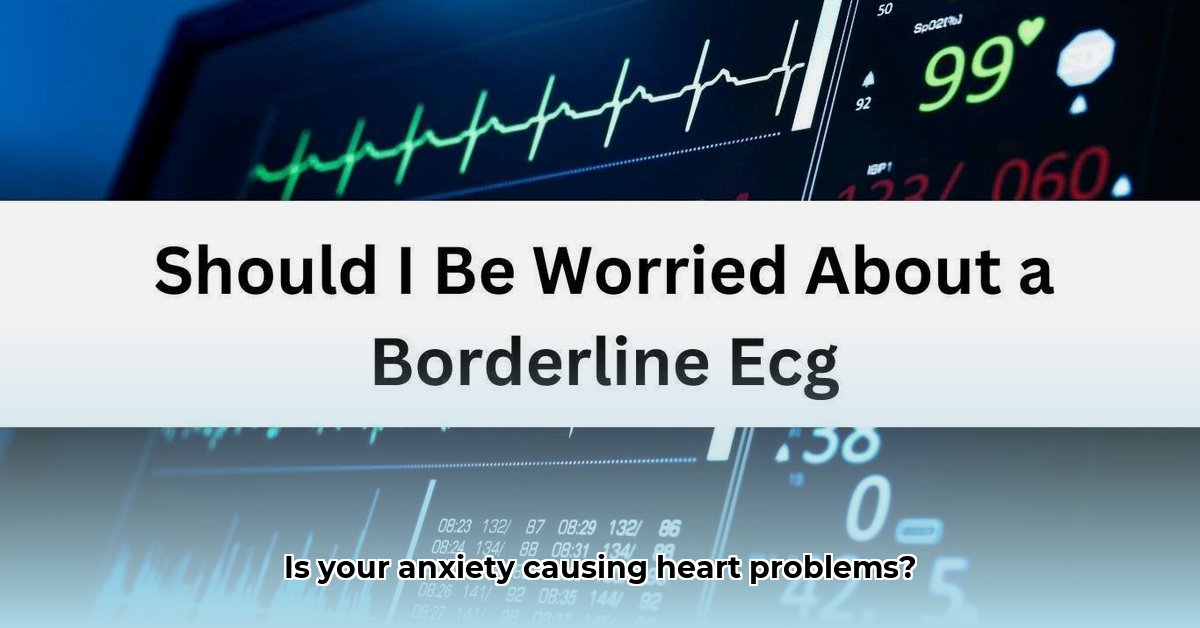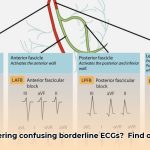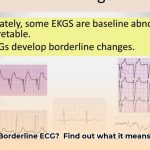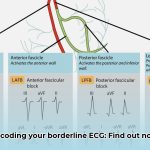Receiving a “borderline” result on your electrocardiogram (ECG)—a test that records your heart’s electrical activity—can understandably cause concern. It signifies that the test detected some slight irregularities in your heart’s electrical activity. However, it’s important to remain calm, as this finding doesn’t automatically indicate a serious heart problem. Factors like anxiety, which is more common than you might think, can influence ECG results. It’s crucial to approach this situation with informed awareness rather than immediate alarm.
It’s important to clarify that a borderline ECG isn’t something to disregard. It serves as a signal for your doctor to conduct a more in-depth investigation to determine the underlying cause. Your doctor will carefully evaluate your medical history, any symptoms you may be experiencing, and your lifestyle to formulate the most appropriate course of action. Key factors, such as electrolyte imbalances or pre-existing heart conditions, must be considered for an accurate diagnosis and subsequent treatment plan.
Exploring Borderline ECG Results and the Impact of Anxiety
Potential Causes of a Borderline ECG
Several factors can contribute to borderline ECG results. Besides anxiety, these include:
- Lifestyle Factors: Your dietary habits, exercise routine, and sleep quality all significantly affect your heart health. Poor nutrition, insufficient physical activity, and inadequate sleep can strain your cardiovascular system, potentially leading to borderline ECG results.
- Electrolyte Imbalances: Electrolytes, such as potassium, calcium, and magnesium, are vital for regulating your heart’s electrical activity. Even minor imbalances can disrupt the heart’s rhythm, resulting in irregularities detected by an ECG. Envision electrolytes as conductors precisely orchestrating your heart’s electrical signals.
- Medications: Certain medications, including over-the-counter drugs and supplements, can have side effects that impact your heart and manifest on an ECG. It’s crucial to provide your doctor with a comprehensive list of all medications and supplements you’re taking to enable accurate interpretation of your ECG results.
- Underlying Heart Conditions: While many borderline ECGs are benign, in some instances, they may indicate the presence of an underlying heart condition that requires further evaluation.
Determining the specific cause of your borderline ECG is essential. Your doctor’s expertise is invaluable in navigating this uncertainty.
The Role of Anxiety in ECG Readings
Anxiety can mimic the symptoms of heart problems. When you’re anxious, your body releases hormones like adrenaline, increasing heart rate and blood pressure. This hormonal surge can lead to changes in your ECG that may appear unusual, even when your heart is healthy. It’s like your heart is sending a false alarm, overreacting to stress and causing temporary abnormalities on the ECG. The American Heart Association recognizes the significant impact of mental health on cardiovascular health.
Distinguishing between anxiety-related ECG changes and actual heart issues requires careful evaluation. Your doctor will consider the overall clinical picture, including your symptoms, medical history, and other test results, in addition to the ECG findings. A mental health assessment is critical for healthcare professionals to provide holistic care to their patients.
A Step-by-Step Guide to Interpreting Your Borderline ECG
Understanding your borderline ECG involves a systematic approach. Here’s how you and your doctor can proceed:
Step 1: Consult with Your Doctor
Schedule a detailed discussion with your doctor about your ECG results. Be prepared to provide a thorough medical history, including any symptoms you’ve experienced (such as chest pain, palpitations, or dizziness) and your current stress levels. The more information you share, the better equipped your doctor will be to assess your condition accurately. Sharing your family’s medical history is also crucial for a comprehensive evaluation of your heart health.
Step 2: Further Diagnostic Testing
Your doctor may recommend additional tests to gain a more comprehensive understanding of your heart health. These tests could include:
- Repeat ECG: Repeating the ECG can help determine if the initial borderline result was due to temporary factors, like anxiety or a transient change in heart rate.
- Blood Tests: Blood tests can identify electrolyte imbalances or other underlying issues affecting your heart rhythm.
- Echocardiogram: This ultrasound test provides detailed images of your heart’s structure and function.
- Holter Monitor: A Holter monitor records your heart’s electrical activity continuously over 24 hours or longer, capturing a more complete picture of your heart’s rhythm than a standard ECG.
- Stress Test: This test evaluates your heart’s response to physical exertion, helping to identify potential problems that may not be apparent at rest.
Step 3: Embrace a Heart-Healthy Lifestyle
Regardless of the results of further testing, adopting a heart-healthy lifestyle is always beneficial. This includes:
- Regular Exercise: Aim for at least 150 minutes of moderate-intensity aerobic exercise per week. Activities like brisk walking, swimming, or cycling can improve your cardiovascular health.
- Balanced Diet: Focus on consuming a diet rich in fruits, vegetables, whole grains, and lean protein. Limit processed foods, saturated fats, and excessive sodium.
- Stress Management: Implement relaxation techniques such as deep breathing exercises, meditation, yoga, or mindfulness. These practices can help reduce stress hormones and promote overall well-being.
Step 4: Seek Support for Anxiety Management
If anxiety is a significant factor in your life, consider seeking professional help. A therapist or psychiatrist can provide strategies for managing anxiety, including therapy, medication, or a combination of both.
Quick Reference Guide: Next Steps Based on Your Situation
| Scenario | Next Steps |
|---|---|
| Borderline ECG, no noticeable symptoms | A repeat ECG is likely; further testing considerations depend on your overall medical history. |
| Borderline ECG, accompanied by concerning symptoms | A comprehensive evaluation with additional testing (as outlined in Step 2) is probably necessary. |
| Borderline ECG, seemingly due to anxiety | Lifestyle modifications (Step 3), anxiety management strategies (Step 4), and a follow-up ECG are recommended. |
A borderline ECG and anxiety should not define your future. With proper evaluation, lifestyle changes, and effective anxiety management, you can proactively manage your heart health and achieve peace of mind. Ongoing research continues to refine our understanding of the complex interplay between ECG findings, anxiety, and cardiovascular health. Stay informed, and always consult with your doctor for personalized guidance. The National Institutes of Health provides valuable resources on heart health and anxiety disorders.
Addressing Anxiety-Related Borderline ECGs in Young Adults
Key Points:
- The physiological manifestations of anxiety can mimic heart problems on an ECG.
- A borderline ECG is not a conclusive diagnosis but a prompt for further evaluation.
- A holistic approach, incorporating a mental health assessment, is essential for effective treatment.
If you’re a young adult experiencing a racing heart, shortness of breath, or chest tightness, and your ECG reveals borderline findings, it’s natural to feel worried. The connection between anxiety and borderline ECG results is often misunderstood. Let’s explore this link.
Understanding ECGs and Anxiety’s Impact
An electrocardiogram (ECG) is an invaluable tool for measuring your heart’s electrical activity and identifying potential heart problems. However, when anxiety is present, it can trigger your body’s fight-or-flight response, leading to an increased heart rate and altered heart rhythm. These changes can manifest as borderline or unusual results on an ECG, particularly in individuals with panic disorder. Open communication with healthcare providers is especially important for patients with panic disorders and can help minimize anxiety.
The Significance of Holistic Treatment
Effectively addressing borderline ECG findings in the context of anxiety necessitates a comprehensive approach that considers your overall well-being. It’s crucial to collaborate closely with your doctor to address both the physical and mental health aspects of your condition.
- Best Books on Meditation Recommended by Mindfulness Experts - January 30, 2026
- Best Mindfulness Books for Anxiety, Sleep, and Daily Peace - January 29, 2026
- Books On Mindfulness For A Happier, More Present Life - January 28, 2026
















